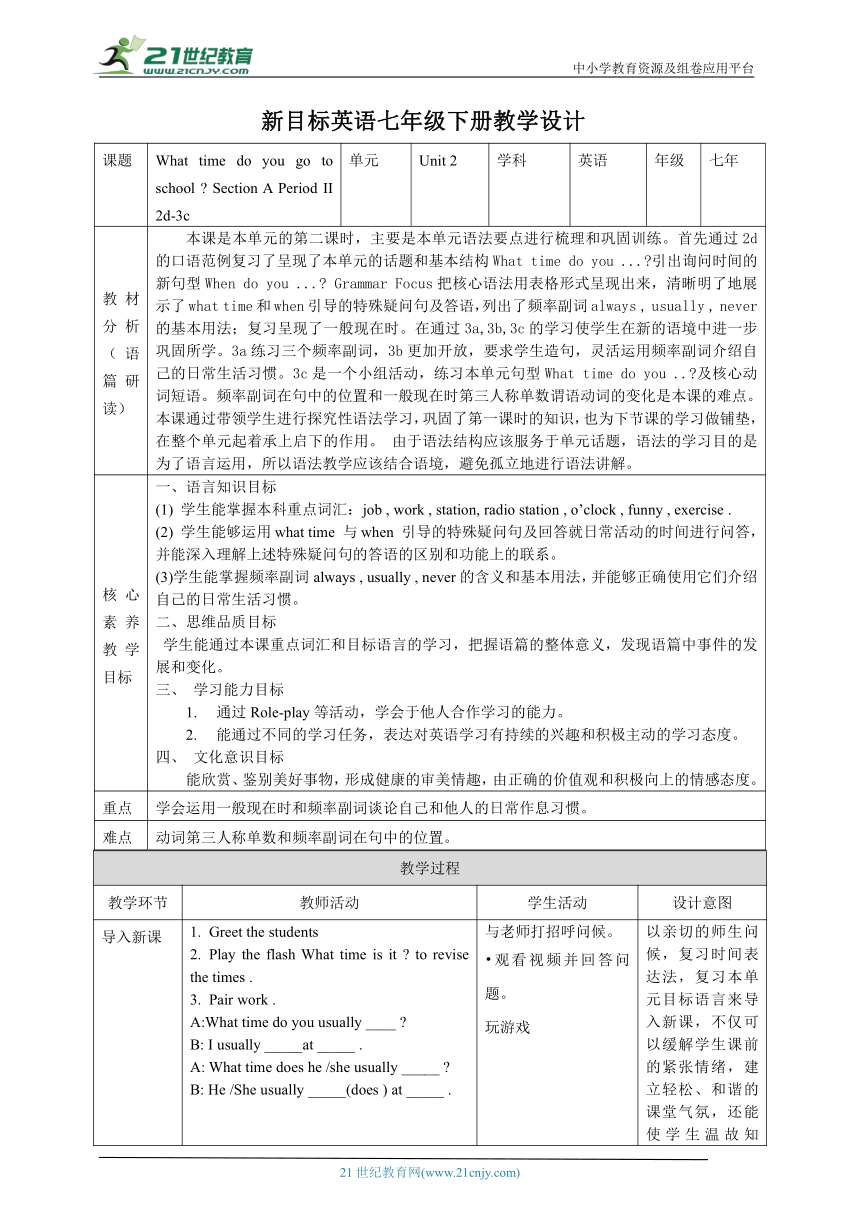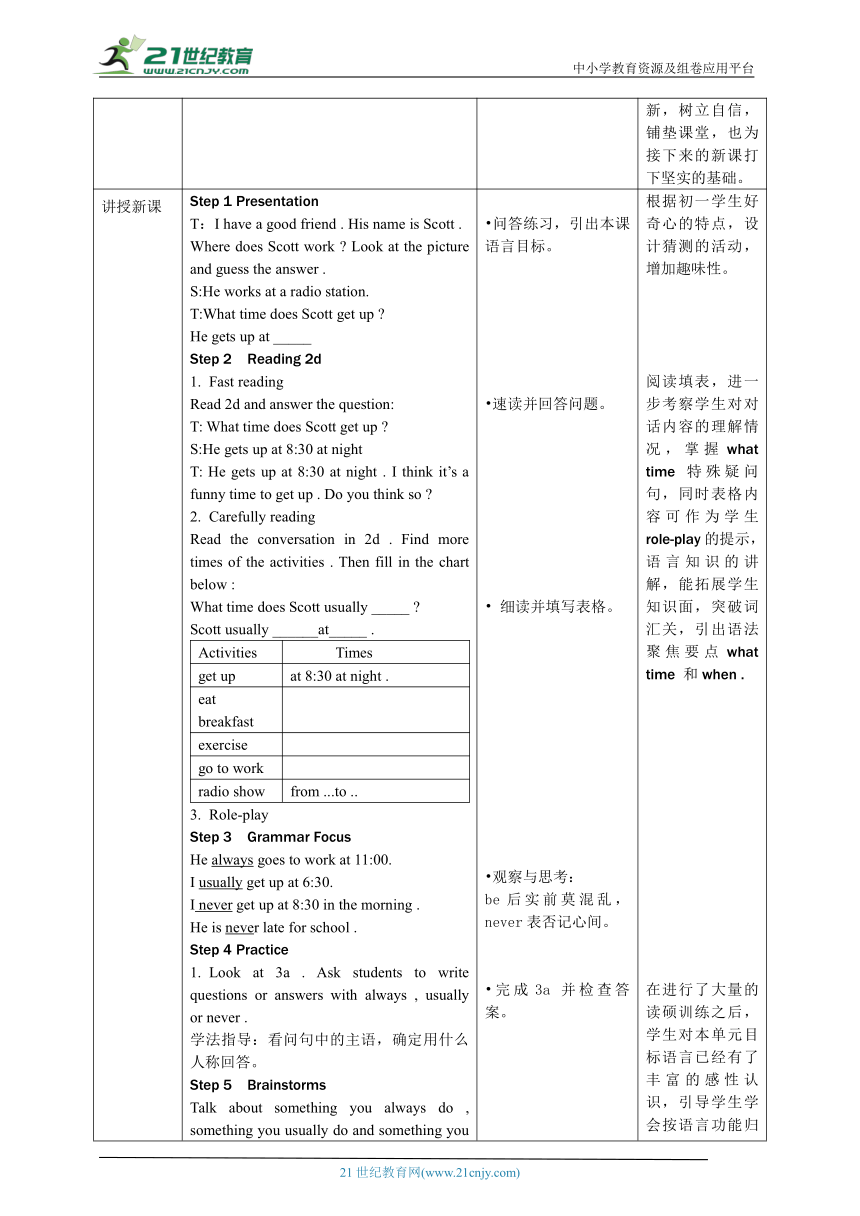【核心素养目标】Unit 2 What time do you go to school Section A 2d-3c表格教学设计
文档属性
| 名称 | 【核心素养目标】Unit 2 What time do you go to school Section A 2d-3c表格教学设计 |  | |
| 格式 | zip | ||
| 文件大小 | 1.2MB | ||
| 资源类型 | 试卷 | ||
| 版本资源 | 人教新目标(Go for it)版 | ||
| 科目 | 英语 | ||
| 更新时间 | 2023-02-22 15:14:06 | ||
图片预览


文档简介
中小学教育资源及组卷应用平台
新目标英语七年级下册教学设计
课题 What time do you go to school Section A Period II 2d-3c 单元 Unit 2 学科 英语 年级 七年
教材分析(语篇研读) 本课是本单元的第二课时,主要是本单元语法要点进行梳理和巩固训练。首先通过2d的口语范例复习了呈现了本单元的话题和基本结构What time do you ... 引出询问时间的新句型When do you ... Grammar Focus把核心语法用表格形式呈现出来,清晰明了地展示了what time和when引导的特殊疑问句及答语,列出了频率副词always , usually , never 的基本用法;复习呈现了一般现在时。在通过3a,3b,3c的学习使学生在新的语境中进一步巩固所学。3a练习三个频率副词,3b更加开放,要求学生造句,灵活运用频率副词介绍自己的日常生活习惯。3c是一个小组活动,练习本单元句型What time do you .. 及核心动词短语。频率副词在句中的位置和一般现在时第三人称单数谓语动词的变化是本课的难点。本课通过带领学生进行探究性语法学习,巩固了第一课时的知识,也为下节课的学习做铺垫,在整个单元起着承上启下的作用。 由于语法结构应该服务于单元话题,语法的学习目的是为了语言运用,所以语法教学应该结合语境,避免孤立地进行语法讲解。
核心素养教学目标 一、语言知识目标(1) 学生能掌握本科重点词汇:job , work , station, radio station , o’clock , funny , exercise . (2) 学生能够运用what time 与when 引导的特殊疑问句及回答就日常活动的时间进行问答,并能深入理解上述特殊疑问句的答语的区别和功能上的联系。 (3)学生能掌握频率副词always , usually , never的含义和基本用法,并能够正确使用它们介绍自己的日常生活习惯。 二、思维品质目标 学生能通过本课重点词汇和目标语言的学习,把握语篇的整体意义,发现语篇中事件的发展和变化。 学习能力目标通过Role-play等活动,学会于他人合作学习的能力。 能通过不同的学习任务,表达对英语学习有持续的兴趣和积极主动的学习态度。 文化意识目标能欣赏、鉴别美好事物,形成健康的审美情趣,由正确的价值观和积极向上的情感态度。
重点 学会运用一般现在时和频率副词谈论自己和他人的日常作息习惯。
难点 动词第三人称单数和频率副词在句中的位置。
教学过程
教学环节 教师活动 学生活动 设计意图
导入新课 Greet the students Play the flash What time is it to revise the times . Pair work . A:What time do you usually ____ B: I usually _____at _____ . A: What time does he /she usually _____ B: He /She usually _____(does ) at _____ . 与老师打招呼问候。 观看视频并回答问题。 玩游戏 以亲切的师生问候,复习时间表达法,复习本单元目标语言来导入新课,不仅可以缓解学生课前的紧张情绪,建立轻松、和谐的课堂气氛,还能使学生温故知新,树立自信,铺垫课堂,也为接下来的新课打下坚实的基础。
讲授新课 Step 1 Presentation T:I have a good friend . His name is Scott . Where does Scott work Look at the picture and guess the answer . S:He works at a radio station.T:What time does Scott get up He gets up at _____ Step 2 Reading 2d Fast reading Read 2d and answer the question: T: What time does Scott get up S:He gets up at 8:30 at night T: He gets up at 8:30 at night . I think it’s a funny time to get up . Do you think so Carefully reading Read the conversation in 2d . Find more times of the activities . Then fill in the chart below :What time does Scott usually _____ Scott usually ______at_____ . Activities Times get up at 8:30 at night . eat breakfastexercise go to work radio show from ...to .. Role-play Step 3 Grammar Focus He always goes to work at 11:00. I usually get up at 6:30. I never get up at 8:30 in the morning . He is never late for school . Step 4 Practice Look at 3a . Ask students to write questions or answers with always , usually or never . 学法指导:看问句中的主语,确定用什么人称回答。 Step 5 Brainstorms Talk about something you always do , something you usually do and something you never do . Student A: I always ..I usually ... I never .. Student B: i Always .. I usually ..I never ... Step 6 Writing Look at 3b. Write about something you always do , something you usually do and something you never do . Students work by themselves . Try to write down their own sentences . Let students exchange their sentences with their partners . Check each other’s answers . Let some students read their sentences aloud to their classmates . Step 7 Interview Look at the box below . Activities Name Name 写出你想要调查的日常活动 。Now, interview two of your classmates . Find out what time they do these activities . Useful expressions:A :Excuse me . What’s your name B: My name is ... A:What time do you usually ... B: I usually ...at ... Share your interview . In our group , A gets up at ______ . He/She goes to school at ____ . He /She exercises at _____ . He eats dinner at _____ . He /She takes a shower at _____ B gets up at ... 问答练习,引出本课语言目标。 速读并回答问题。 细读并填写表格。 观察与思考:be后实前莫混乱,never表否记心间。 完成3a 并检查答案。观察3b,仿写。 对话练习大声朗读句子。 写出你想要调查的日常活动。 根据调查表采访。 分享你的采访。 根据初一学生好奇心的特点,设计猜测的活动,增加趣味性。 阅读填表,进一步考察学生对对话内容的理解情况,掌握what time 特殊疑问句,同时表格内容可作为学生role-play的提示,语言知识的讲解,能拓展学生知识面,突破词汇关,引出语法聚焦要点what time 和when . 在进行了大量的读硕训练之后,学生对本单元目标语言已经有了丰富的感性认识,引导学生学会按语言功能归纳总结,能提高其语言综合用韵能力,实现语言学习由感性到理性的转变,讲练结合,扎实有效,口诀朗朗上口,便于识记,提高课堂效率。
课堂练习 按要求改写句子 。 He exercises on weekends . (对化纤部分提问) __________________________________________ the , bus , hotel , takes , he , the Number 7, to (连词成句) ____________________________________________Tom does his homework every day . (改为否定句) ____________________________________________ The little boy goes to bed at ten . (对画线部分提问) _________________________________________ They work in a school. (对画线部分提问) ______ ______ they ______ 选词填空play watch eat go take fly He gets up at 5:30 and _____ to school at 6:15 every day . Every morning Dad ______ Morning News on TV. Jerry’s uncle often _______ tennis with him after work . What time does Bob _______ breakfast Oh, it’s 7:30 . Please ______ a bus to work . Scott usually ______ a kite in the afternoon .
课堂小结 本科我们通过课堂探究,观察思考,重点学习巩固了:What time引导的特殊疑问句及时间表达法(what time问时间,时刻前面at现)学习了频率副词在句子中的位置。(be后实前莫混乱,never表否记心间)复习一般现在时中第三人称单数的动词变化(单三人称肯定句,谓语一定要变单,如果主语是单三,疑问句中does现,记得动词要还原。 辨析了when 和what time的异同点,使大家的语言学习由感性认识上升到理性认识,并总结归纳了语法结构。 通过自主学习和合作学习,总结本课重点句型,师生共同合作再现本课重点,同时达成本课情感目标。
板书 Unit 2 What time do you go to school Section A 2d-3calways 总是=100% I always get dressed at 6:40. Usually 通常 My brother usually takes shower at 9:00. never My sister is never late for school .
f
21世纪教育网 www.21cnjy.com 精品试卷·第 2 页 (共 2 页)
HYPERLINK "http://www.21cnjy.com/" 21世纪教育网(www.21cnjy.com)
新目标英语七年级下册教学设计
课题 What time do you go to school Section A Period II 2d-3c 单元 Unit 2 学科 英语 年级 七年
教材分析(语篇研读) 本课是本单元的第二课时,主要是本单元语法要点进行梳理和巩固训练。首先通过2d的口语范例复习了呈现了本单元的话题和基本结构What time do you ... 引出询问时间的新句型When do you ... Grammar Focus把核心语法用表格形式呈现出来,清晰明了地展示了what time和when引导的特殊疑问句及答语,列出了频率副词always , usually , never 的基本用法;复习呈现了一般现在时。在通过3a,3b,3c的学习使学生在新的语境中进一步巩固所学。3a练习三个频率副词,3b更加开放,要求学生造句,灵活运用频率副词介绍自己的日常生活习惯。3c是一个小组活动,练习本单元句型What time do you .. 及核心动词短语。频率副词在句中的位置和一般现在时第三人称单数谓语动词的变化是本课的难点。本课通过带领学生进行探究性语法学习,巩固了第一课时的知识,也为下节课的学习做铺垫,在整个单元起着承上启下的作用。 由于语法结构应该服务于单元话题,语法的学习目的是为了语言运用,所以语法教学应该结合语境,避免孤立地进行语法讲解。
核心素养教学目标 一、语言知识目标(1) 学生能掌握本科重点词汇:job , work , station, radio station , o’clock , funny , exercise . (2) 学生能够运用what time 与when 引导的特殊疑问句及回答就日常活动的时间进行问答,并能深入理解上述特殊疑问句的答语的区别和功能上的联系。 (3)学生能掌握频率副词always , usually , never的含义和基本用法,并能够正确使用它们介绍自己的日常生活习惯。 二、思维品质目标 学生能通过本课重点词汇和目标语言的学习,把握语篇的整体意义,发现语篇中事件的发展和变化。 学习能力目标通过Role-play等活动,学会于他人合作学习的能力。 能通过不同的学习任务,表达对英语学习有持续的兴趣和积极主动的学习态度。 文化意识目标能欣赏、鉴别美好事物,形成健康的审美情趣,由正确的价值观和积极向上的情感态度。
重点 学会运用一般现在时和频率副词谈论自己和他人的日常作息习惯。
难点 动词第三人称单数和频率副词在句中的位置。
教学过程
教学环节 教师活动 学生活动 设计意图
导入新课 Greet the students Play the flash What time is it to revise the times . Pair work . A:What time do you usually ____ B: I usually _____at _____ . A: What time does he /she usually _____ B: He /She usually _____(does ) at _____ . 与老师打招呼问候。 观看视频并回答问题。 玩游戏 以亲切的师生问候,复习时间表达法,复习本单元目标语言来导入新课,不仅可以缓解学生课前的紧张情绪,建立轻松、和谐的课堂气氛,还能使学生温故知新,树立自信,铺垫课堂,也为接下来的新课打下坚实的基础。
讲授新课 Step 1 Presentation T:I have a good friend . His name is Scott . Where does Scott work Look at the picture and guess the answer . S:He works at a radio station.T:What time does Scott get up He gets up at _____ Step 2 Reading 2d Fast reading Read 2d and answer the question: T: What time does Scott get up S:He gets up at 8:30 at night T: He gets up at 8:30 at night . I think it’s a funny time to get up . Do you think so Carefully reading Read the conversation in 2d . Find more times of the activities . Then fill in the chart below :What time does Scott usually _____ Scott usually ______at_____ . Activities Times get up at 8:30 at night . eat breakfastexercise go to work radio show from ...to .. Role-play Step 3 Grammar Focus He always goes to work at 11:00. I usually get up at 6:30. I never get up at 8:30 in the morning . He is never late for school . Step 4 Practice Look at 3a . Ask students to write questions or answers with always , usually or never . 学法指导:看问句中的主语,确定用什么人称回答。 Step 5 Brainstorms Talk about something you always do , something you usually do and something you never do . Student A: I always ..I usually ... I never .. Student B: i Always .. I usually ..I never ... Step 6 Writing Look at 3b. Write about something you always do , something you usually do and something you never do . Students work by themselves . Try to write down their own sentences . Let students exchange their sentences with their partners . Check each other’s answers . Let some students read their sentences aloud to their classmates . Step 7 Interview Look at the box below . Activities Name Name 写出你想要调查的日常活动 。Now, interview two of your classmates . Find out what time they do these activities . Useful expressions:A :Excuse me . What’s your name B: My name is ... A:What time do you usually ... B: I usually ...at ... Share your interview . In our group , A gets up at ______ . He/She goes to school at ____ . He /She exercises at _____ . He eats dinner at _____ . He /She takes a shower at _____ B gets up at ... 问答练习,引出本课语言目标。 速读并回答问题。 细读并填写表格。 观察与思考:be后实前莫混乱,never表否记心间。 完成3a 并检查答案。观察3b,仿写。 对话练习大声朗读句子。 写出你想要调查的日常活动。 根据调查表采访。 分享你的采访。 根据初一学生好奇心的特点,设计猜测的活动,增加趣味性。 阅读填表,进一步考察学生对对话内容的理解情况,掌握what time 特殊疑问句,同时表格内容可作为学生role-play的提示,语言知识的讲解,能拓展学生知识面,突破词汇关,引出语法聚焦要点what time 和when . 在进行了大量的读硕训练之后,学生对本单元目标语言已经有了丰富的感性认识,引导学生学会按语言功能归纳总结,能提高其语言综合用韵能力,实现语言学习由感性到理性的转变,讲练结合,扎实有效,口诀朗朗上口,便于识记,提高课堂效率。
课堂练习 按要求改写句子 。 He exercises on weekends . (对化纤部分提问) __________________________________________ the , bus , hotel , takes , he , the Number 7, to (连词成句) ____________________________________________Tom does his homework every day . (改为否定句) ____________________________________________ The little boy goes to bed at ten . (对画线部分提问) _________________________________________ They work in a school. (对画线部分提问) ______ ______ they ______ 选词填空play watch eat go take fly He gets up at 5:30 and _____ to school at 6:15 every day . Every morning Dad ______ Morning News on TV. Jerry’s uncle often _______ tennis with him after work . What time does Bob _______ breakfast Oh, it’s 7:30 . Please ______ a bus to work . Scott usually ______ a kite in the afternoon .
课堂小结 本科我们通过课堂探究,观察思考,重点学习巩固了:What time引导的特殊疑问句及时间表达法(what time问时间,时刻前面at现)学习了频率副词在句子中的位置。(be后实前莫混乱,never表否记心间)复习一般现在时中第三人称单数的动词变化(单三人称肯定句,谓语一定要变单,如果主语是单三,疑问句中does现,记得动词要还原。 辨析了when 和what time的异同点,使大家的语言学习由感性认识上升到理性认识,并总结归纳了语法结构。 通过自主学习和合作学习,总结本课重点句型,师生共同合作再现本课重点,同时达成本课情感目标。
板书 Unit 2 What time do you go to school Section A 2d-3calways 总是=100% I always get dressed at 6:40. Usually 通常 My brother usually takes shower at 9:00. never My sister is never late for school .
f
21世纪教育网 www.21cnjy.com 精品试卷·第 2 页 (共 2 页)
HYPERLINK "http://www.21cnjy.com/" 21世纪教育网(www.21cnjy.com)
同课章节目录
- Unit 1 Can you play the guitar?
- Section A
- Section B
- Unit 2 What time do you go to school?
- Section A
- Section B
- Unit 3 How do you get to school?
- Section A
- Section B
- Unit 4 Don't eat in class.
- Section A
- Section B
- Unit 5 Why do you like pandas?
- Section A
- Section B
- Unit 6 I'm watching TV.
- Section A
- Section B
- Review of Units 1-6
- Unit 7 It's raining!
- Section A
- Section B
- Unit 8 Is there a post office near here?
- Section A
- Section B
- Unit 9 What does he look like?
- Section A
- Section B
- Unit 10 I'd like some noodles.
- Section A
- Section B
- Unit 11 How was your school trip?
- Section A
- Section B
- Unit 12 What did you do last weekend?
- Section A
- Section B
